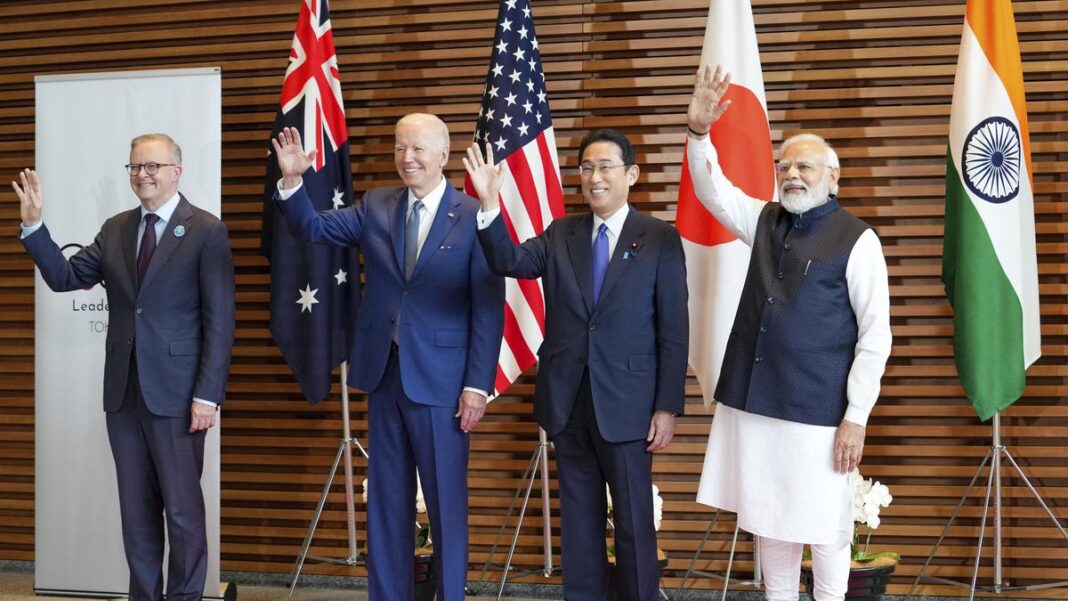Quad Leaders from Australia, India, Japan, and the United States gathered to enhance joint security efforts in Asia’s trade-rich waters. Outgoing U.S. President Joe Biden hosted this latest summit of the Quad, a grouping formed to address shared concerns about China’s growing influence. The leaders emphasised stronger cooperation in defense and maritime security, signalling a clear message to Beijing.
Quad Focuses on Security
Meeting near his hometown in Delaware, Biden welcomed Japanese Prime Minister Fumio Kishida, Indian Prime Minister Narendra Modi, and Australian Prime Minister Anthony Albanese. The leaders announced new security steps, including joint coast guard operations starting next year. These operations will involve personnel from Australia, Japan, and India working aboard a U.S. coast guard vessel. The group also plans to deepen military logistics cooperation, although specific details on the locations of these activities were not disclosed.
Another key agreement was the expansion of the Indo-Pacific Partnership for Maritime Domain Awareness. This initiative, launched two years ago, focuses on improving monitoring and surveillance of critical waterways in the region.
South China Sea Tensions
While the Quad’s joint statement did not directly mention China, the leaders condemned “coercive and intimidating maneuvers” in the South China Sea. China claims almost the entire South China Sea, overlapping with territorial claims from the Philippines, Vietnam, Malaysia, and Brunei. In the East China Sea, China also contests territories claimed by Japan and Taiwan.
Biden pointed out that Chinese President Xi Jinping is attempting to focus on domestic economic challenges while maintaining a firm stance on international disputes. Xi has objected to the Quad, viewing it as an effort to encircle China and escalate conflict.
North Korea and Russian Involvement
In addition to addressing China, the Quad leaders took a firm stance on North Korea. The joint statement condemned North Korea’s ballistic missile launches and its “malicious cyber activity.” A U.S. official revealed that the group is also concerned about Russia’s military support for North Korea, which further complicates the region’s security landscape.
India’s Changing Position
India has traditionally been cautious about deepening military alliances. However, Lisa Curtis, an expert on Asia policy, noted that China’s recent aggression in maritime territories might be influencing India’s openness to increased security cooperation within the Quad. India’s shift could mark a significant change in the group’s dynamics, as India’s strategic positioning plays a crucial role in regional security.
A Focus on Critical Technologies and Health
Beyond military cooperation, the Quad is focusing on technology and health initiatives. The leaders agreed to provide critical security technologies, such as a new open radio access network, to Pacific Islands and Southeast Asia. These regions have become areas of intense competition with China.
On the health front, the Quad announced a joint initiative aimed at combating cervical cancer, further expanding their cooperation beyond just security concerns.
Biden’s Efforts to Strengthen the Quad
For Biden, hosting this summit was part of a larger effort to solidify the Quad as a key component of U.S. foreign policy. Biden raised the Quad to the leader level in 2021, and it has since become a significant platform for discussions on regional security and cooperation. With Biden set to leave office after the upcoming U.S. election, he aimed to institutionalize the Quad for future administrations.
The other Quad leaders also face political transitions. Japanese Prime Minister Kishida is stepping down after a leadership contest next week, and Australia will hold elections by next year. However, Biden remains confident in the Quad’s staying power. When asked about the future of the group, he confidently declared that the Quad “is here to stay.”
Future of Quad
The Quad’s growing focus on security cooperation marks a significant shift in its activities, largely driven by concerns over China’s intentions in the Indo-Pacific. With joint coast guard operations and expanded technology partnerships, the group is strengthening its presence in the region. As leadership changes loom, the Quad’s future seems secure, with all leaders emphasising the importance of continued collaboration to address regional challenges.

